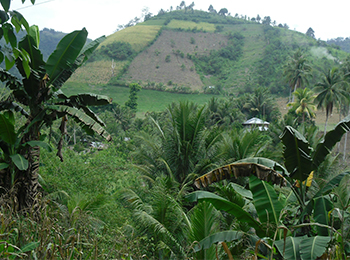About 1 result/s
-
Volume 5, Issue 2, September 2023
How can local governments build the resilience of disaster-affected households? This is an important concern since climate change is expected to worsen climate-related disasters especially among vulnerable sectors such as the urban poor in developing countries. For the Philippines, the most at-risk country in the World Risk Index 2022, it is important to address the vulnerability of the urban poor living in danger zones.

-
Volume 5, Issue 1, August 2023
The Philippines is highly exposed and vulnerable to tropical cyclones (also known as typhoons), which caused over ₱352 billion worth of losses and damages to agriculture between 2000 and 2021. The study focuses on the impacts of typhoons on banana production in the Philippines. Bananas are a crucial crop for consumption, nutrition and the economy. Mindanao accounts for a majority of the country’s production. The study examines the physical sensitivity of bananas to hazards like typhoons, considering factors such as wind speed, flood-prone areas, and slope, using geographical methods.

-
Volume 5, Issue 1, June 2022
With the increasing
incidence of extreme weather events, it is important to identify appropriate
strategies to enhance the adaptive capacity of households. In the Philippines
for example, climate-induced flooding is displacing many people. This is true
in the case of Pila, Laguna, Philippines, which is often flooded when there are
typhoons and monsoon events. Strong typhoons in the past caused houses near the
lake to be submerged in flood waters and forced households to evacuate. The
impact however on these households would vary depending on their adaptive
capacities. This study aims to assess the adaptive capacities of households in
lakeshore communities susceptible to flooding and identify strategies for
policy-makers.

-
Volume 4, Issue 1, April 2021
This study assessed the climate trends, changes, impacts, and adaptation strategies of farm households in five barangays in the Roxas mountain range, Koronadal City, South Cotabato by using household survey data from 265 respondents, and complimented with focus group discussions, and key informant interviews. The findings of the study revealed that climate changes are manifested by floods, landslides, and droughts as experienced by the local people which caused devastation and affected socioeconomic and environmental conditions of farming livelihood. Farmers used to have bountiful harvests, however, this situation recently changed due to the increasing climate-related risk events. The existing adaptation strategies are just stop-gap solutions that address the effects of climate change, but do not consider the root causes. To consider future changes in climate patterns, the socioeconomic and political structure and processes of the communities need to change by addressing multifaceted drivers of climate change hazards and their impacts. Some grassroot-level transformative adaptation strategies identified in the study consisted of socioeconomic facets, specifically, investment in children’s education, financial management, family planning, and development of alternative on-farm and nonfarm livelihood options. The environmental aspect, including the promotion of agroforestry system, water impoundment technologies, and advanced early warning system, were also considered.

-
Volume 4, Issue 1, January 2021
The Philippines is one of the countries
highly vulnerable to climate change, and this condition threatens further the meager
agricultural production in the country. However, while the Philippines has
established the institutional foundations linking climate change to agriculture,
through policies and legislation, advances in climate change adaptation have
been slow, especially at the local level. This paper demonstrated that this gap
in policy formulation and actual implementation stems from the lack of institutional
analysis in CCA efforts in the Philippines. The paper concludes that along with
the scientific and technological discussions, institutional conversations
should be among the initial vital steps in CCA planning, and policy and
decision-making. It further advocates that institutional analysis can be the
entry point for designing reforms toward effective CCA implementation.

-
Volume 4, Issue 1, January 2020
This paper connects climate change and hydrometeorological
calamities based on econometric evidence that links atmospheric CO2
accumulations to floods and storms. The study uses climate data from 155
countries, with a period spanning 46 years (1970–2016) and adopted a
statistical and econometric approach to assess the factors that have
contributed to the increase in the frequency of intense flood and storm events.
Findings showed that the number of climate disasters could double in less than 21
years, and thus severely damage the environment, socioeconomic progress, and
welfare of millions of people worldwide.

-
Volume 3, Issue 1, December 2018
Only few studies investigated the adaptive capacity or
adaptation practices of indigenous peoples (IPs) in the Philippines and none so
far in the Compostela Valley. Since the landslide and flash flood events in
2012 brought by Typhoon Bopha, no systematic study has been conducted to
compare the adaptive capacity of IPs and non-IPs in New Bataan’s most affected
communities. This paper contributes to the assessments of adaptive behavior
with the ultimate goal of stimulating adaptation support to the most vulnerable
people.

-
Volume 3, Issue 1, August 2018
In 2013, Super Typhoon Haiyan, one of the strongest tropical
cyclones to impact the Philippines, made landfall in Tacloban City. The typhoon
incapacitated the city, breaking down its main lifeline, the transport system.
This article analyzes how a weakened transport system exacerbates disaster
vulnerability, specifically manifested in the restricted mobility and access of
people and communities immediately after an extreme event.
-
Volume 3, Issue 1, February 2018
Tacloban, Philippines, the city most devastated by typhoon Haiyan in 2013, faces severe water supply constraints, particularly on the relocation sites that are expected to accommodate 40% of Tacloban's population by 2018. This study assess the impacts of climate change on the hydrological system on which Tacloban relies for water supply purposes.
-
Volume 2, Issue 2, July 2017
The livelihoods of Aytas of Floridablanca, Pampanga, Philippines are dependent on natural resources, which are prone to climate change impacts. To assess their adaptive capacity, this paper analyzed the different resources available in their community using the Sustainable Livelihoods Approach Framework.